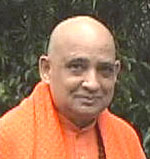|
| |
| |
|
| Frequently
Asked Questions |
 |
| Swami
Jyotirmayananda |
|
Q. Please tell me about the Sages of ancient India?
|
|
Answer: There were numerous sages who have recorded their spiritual
experiences from time to time. This is the reason why the spiritual literature
of India is so vast and extensive.
These were important sages: The four kumaras: Sanaka, Sanadhana, Sanatana,
and Sanat Kumar; Sage YajnaValkya, Sage Narada, Shwetashwatara, Nachiketa, Yama,
Angira, Kashyapa, Vasishta, Sage Pippalada, Vishwamitra, Bharadwaja, Gautama,
Dattatreya, Durvasa, Patanjali, Kapila, Vyasa, Agastya, Valmiki, Markendaya,
Shuka, Royal Sage Janaka, Bhisma, Yudhishtara, Vidura, Woman Sages Madalasa,
Chudala, Gargi, Anayusa and many other.
|
|
Q. Who among them are widely known.
|
|
Answer: Sage Valmiki is the author of Ramayana and Yoga Vasistha. Vyasa is
the compiler and author of the Vedas, Puranas, Itihasas (epic writing of
Mahabharata) and numerous Hindu scriptures. Patanjali is the author of the
Raja Yoga Sutras. Vasistha was a great exponent of the nondualistic
philosophy of Vedanta. His teachings imparted to royal prince Rama are
recorded in the monumental work of Yoga Vasistha.
|
|
Q. Who were the Sages who flourished during, before and
after the 16th century? |
| Answer: Saint Tulsidas (the famous author of Hindi
Ramayana), Surdas (the author of numerous poems directed towards the
Love of Krishna), Kabira (the mystic poet), Mira (the God-intoxicated
woman saint whose melodious songs are sung all over India), Saint Raidas,
Lord Chaitanya, Guru Nanaka, Narsi Mehta and many other have filled
Indian culture with their devotional contributions; the splendour of
which shines brighter as the time passes by.
|
|
| Q. When was Sri Sankaracharya born? What are his
contributions to Indian Philosophy? |
| Answer: Sri Shankaracharya was born in 508 B.C.
But according western scholars he is said to be born in 668 A.D. He was
born in South India in a Brahmin family. He was the chief exponent of
the Non-dualistic system of Vedanta. In his short life of 32 years, he
revived the philosophy of Vedanta and brought about spiritual awakening
throughout India. he religious order of Sanyasa originated from
Shankaracharya. His commentaries on the Upanishads and important
religious scriptures are still read and studied as the authentic basis
for all Yogic teachings. He sums up his teachings in brief: 'Brahman is
truth, the world is false, the individual soul is none other than the
Supreme Brahman.'
|
|
| Q. Please tell me about the Sages and Saints of recent
times? |
| Answer: Sri Ramakrishna Paramhansa
(1833-1886), was born in Bengal. His teachings were brought to the
west through his illustrious disciple Swami Vivekananda. He taught the
unversality of religion, and integration of Yogas. He was a devotee of
Goddess Kali, and at the same time, a dynamic exponent of Vedantic
philosophy.
Swami Vivekananda (1863-1902), born in Bengal, he was illustrious
disciple of Sri Ramakrishna Paramhansa. During his short life he brought
vitality and dynamism in the understanding of Hindu culture and its
philosophy. There are many centers all over the globe expounding the
teachings of Ramakrishna and Vivekananda.
Swami Ramatirtha (1873-1906), born in Punjab, he was a dynamic
exponent of Non-dualism. He was divinely intoxicated. He point out the
need of practical application of Vedanta in day to day life.
Sri Ramana Maharishi (1879-1950) born in South India, he was a
powerful Sage who inspired the fundamentals of Vedantic movement in the
present times of the world. Enquiry of "Who am I?" and the
discover of the true identity of the Self constituted the central theme
of his teachings.
Mahatma Gandhi (1869-1948), born in Porbander, Gujarat, he was Father
of political freedom for India. He brought the idealism of Hindu culture
into the field of politics. He engendered the need for Non-violence and
universal understanding in the international affairs of political
movements. His exemplary life, self-discipline, purity, and adherence to
truth has contributed to a new vitality in the religious understanding
of mankind.
Yogi Sri Aurobindo (1872-1950), born in Calcutta, he presented an
integral approach to spiritual unfoldment. His scholarly writings with
penetrating insight into life have won the devotion and admiration of
many in the world.
Sri Rabindranath Tagore (1861-1941), born in Calcutta, was a poet,
novelist, and philospher-saint of recent India. His contributions to
arts, philosophy and literature are immense.
Sri Swami Sivananda (1887 - 1965), born in South India, established
the center of Divine Life Society in Rishikesh, Himalayas. He was an
illustrious exponent of Yoga of Synthesis. His teachings combined
Wisdom, Devotion, Meditation and Action. Through his disciples and
followers, his spiritual influence and inspiring teachings continue to
elevate human minds.
|
|
|
|
